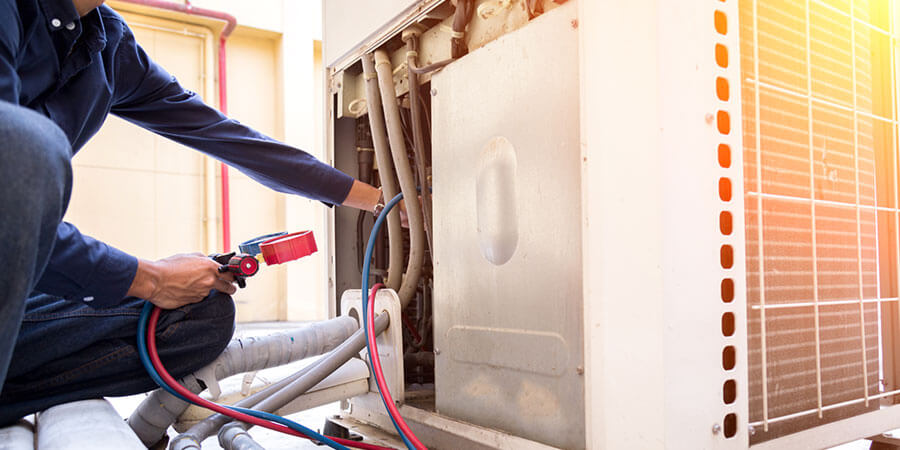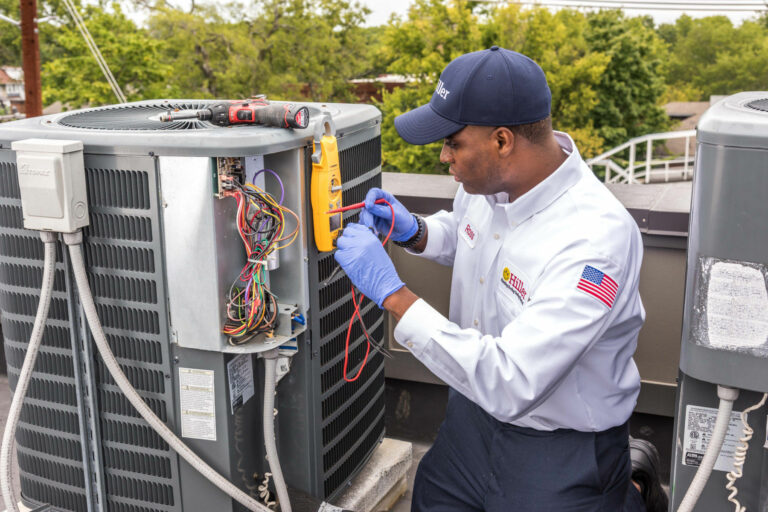Selecting Between a Heatpump and Heater: Secret Considerations for Your Heating And Cooling Demands
When evaluating home heating alternatives for a/c requires, the choice in between a heatpump and a heating system can be complex. Each system supplies distinctive benefits customized to particular climates and energy efficiency objectives. Recognizing these differences is vital for making an enlightened option. Secret factors such as installation expenses and environmental influence better make complex the option procedure. Which option truly aligns with one's comfort and sustainability preferences? The complying with areas will explore these factors to consider in detail.
Comprehending Warmth Pumps: Exactly How They Function and Their Advantages
While numerous house owners take into consideration different heating options, understanding just how heatpump function and their advantages can substantially influence their decision. Warm pumps operate by moving warmth as opposed to creating it. In the winter, they remove warmth from the outside air or ground and transfer it indoors, while in the summertime, they reverse this process, cooling down the home by getting rid of warmth outside. This dual capability makes them functional for year-round climate control.One of the primary benefits of heatpump is their energy performance. They utilize considerably less power compared to typical home heating systems, potentially leading to reduced utility expenses (furnace replacement). In addition, warmth pumps have a smaller sized carbon footprint, making them an eco-friendly selection. They likewise require much less maintenance than standard systems, contributing to long-lasting cost savings. On the whole, understanding the technicians and benefits of warmth pumps can aid homeowners make notified decisions regarding their heating and cooling needs
Checking Out Heaters: Types, Procedure, and Advantages
Heating systems come in different kinds, consisting of gas, electrical, and oil designs, each with unique operational mechanisms. Comprehending these differences is vital, as they affect effectiveness and heating efficiency. Furthermore, furnaces supply many benefits, such as regular heat outcome and integrity in cooler environments.
Kinds of Furnaces
Heater can vary considerably in layout and procedure, with furnaces being a preferred choice among house owners. There are a number of kinds of heaters, each using different fuel resources and technologies. Gas heating systems prevail, leveraging all-natural gas to create heat successfully. Electric heaters, on the various other hand, utilize electrical resistance to create warmth, commonly favored for their simple setup. Oil heating systems, while much less typical, work in areas with restricted gas gain access to (heat pump replacement ooltewah tn). Additionally, condensing heating systems take full advantage of power performance by capturing and recycling exhaust gases. Each type runs via a system of heat exchangers and ductwork to disperse cozy air throughout a home. Understanding the distinctions between these furnace kinds is essential for notified a/c choices
Advantages of Heaters
For home owners looking for trustworthy heat throughout cool months, the advantages of heaters are significant. Heating systems give consistent heating, ensuring also temperatures throughout the home. They are especially reliable in extreme chilly, often outperforming heat pumps in cold problems. Numerous kinds, including gas, electric, and oil furnaces, supply adaptability to meet varied requirements and preferences.Furnaces additionally have a tendency to have reduced initial installation costs compared to warm pumps, making them a more easily accessible option for lots of. Their durable layout adds to a much longer life-span, with lots of units lasting over 15 years with appropriate maintenance. Furthermore, modern-day heaters are commonly geared up with sophisticated technology for boosted effectiveness, which can cause minimized power bills. On the whole, heating systems remain a reputable option for efficient home heating.

Power Effectiveness: Comparing Warmth Pumps and Furnaces
When comparing energy efficiency in between warmth pumps and heating systems, the Seasonal Power Performance Ratio (SEER) plays an essential role in determining performance. Additionally, an operational price analysis discloses the lasting monetary ramifications of each system. Understanding these elements can guide property owners in making notified choices regarding their home heating services.
Seasonal Energy Performance Ratio
Energy performance plays an important role in the decision-making procedure between heatpump and furnaces, particularly when taking into consideration the Seasonal Power Efficiency Proportion (SEER) This metric measures the cooling effectiveness of heatpump over a whole cooling period, giving a standard method to examine efficiency. Greater SEER rankings suggest greater power effectiveness, translating to reduced power usage and reduced energy expenses. On the other hand, heating systems are generally examined utilizing the Yearly Fuel Use Efficiency (AFUE) ranking, which shows heating effectiveness. When contrasting these 2 systems, house owners should focus on SEER rankings for heatpump, as they straight effect overall power savings and ecological sustainability. A thorough understanding of SEER can especially affect the long-lasting fulfillment and cost-effectiveness of the chosen a/c service.
Functional Expense Evaluation
Recognizing the functional expenses connected with heatpump and furnaces is essential for home owners evaluating their options. Warmth pumps usually provide greater energy performance, transforming electrical energy into warm with very little waste. This results in reduced regular monthly energy bills, especially in modest environments. Conversely, typical heating systems, especially gas models, may have lower in advance costs yet can incur greater functional expenses over time due to fuel prices and performance ratings.Moreover, heat pumps can operate as both heating and cooling down systems, potentially lowering the demand for different cooling and heating devices. While initial financial investments for heat pumps might be check my source greater, their lasting cost savings in energy efficiency can make them a much more economical choice for many homes. Mindful analysis of local energy rates is necessary to determine the most effective alternative.
Setup Expenses: What to Expect for Each Heating Unit
Installation costs for home heating systems can vary considerably between warmth pumps and heating systems, affecting house owners' choices. Heatpump normally have higher in advance installation costs, usually varying from $3,500 to $8,000, depending on the device size and complexity of installment. This includes the outside unit, interior handling system, and essential ductwork alterations. Conversely, heating systems often tend to have reduced preliminary costs, averaging between $2,500 and $6,000, which can be appealing for budget-conscious property owners. Installment expenditures can boost if comprehensive ductwork is required.Moreover, the selection of fuel type for heating systems-- all-natural gas, gas, or electrical-- can additionally impact installation expenses. While warmth pumps offer energy performance, their initial financial investment may deter some purchasers. Eventually, examining setup expenses together with lasting savings and effectiveness will certainly help house owners in making notified her explanation decisions concerning their heating unit.
Environment Considerations: Which System Carries Out Better in Your Area
How do environment problems affect the effectiveness of heater? The efficiency of heatpump and furnaces can differ greatly relying on the local climate. In moderate climates, warmth pumps excel by efficiently transferring warm from the outdoors air, making them an energy-saving alternative. Their efficiency diminishes in incredibly chilly temperature levels, where they might battle to draw out adequate heat. Conversely, furnaces, especially gas designs, give constant and dependable heat no matter outdoor problems, making them preferable in chillier regions.In locations that experience milder winter seasons, heatpump can operate effectively year-round, giving both home heating and air conditioning. On the other hand, areas with rough winters months usually take advantage of the effectiveness of heaters. Ultimately, recognizing the neighborhood climate is important when making a decision between a heatpump and a heater, as it straight influences their functional effectiveness and overall efficiency.
Maintenance Demands: Long-Term Look After Warmth Pumps vs. Furnaces
While both heatpump and heating systems require regular maintenance to assure peak efficiency, their certain demands and care regimens differ considerably. Heating systems generally require much less frequent focus, with yearly examinations sufficing to check for gas leaks, tidy filters, and assess overall capability. Their simpler design frequently allows for straightforward repairs.In comparison, heatpump demand semiannual upkeep as a result of their dual role in cooling and heating. This includes cleaning coils, inspecting refrigerant degrees, and ensuring that both the indoor and outside systems operate at their ideal. Furthermore, heat pump maintenance frequently entails more intricate parts, making expert maintenance essential.Neglecting upkeep can bring about reduced effectiveness and increased energy costs for both systems. Inevitably, house owners ought to think about these lasting care needs when choosing between a heatpump and a heater, as aggressive maintenance can expand the life expectancy and efficiency of either system substantially.
Ecological Impact: Picking a Sustainable Heating Option
The ecological effect of furnace is a vital examination for property owners looking for sustainable alternatives. Heatpump are typically much more energy-efficient than standard furnaces, as they move warmth instead than produce it, greatly lowering carbon emissions. By making use of renewable energy sources, such as air-source or geothermal warmth pumps, house owners can better lessen their environmental footprint.On the other hand, all-natural gas furnaces discharge greenhouse gases and contribute to air pollution, though they often provide higher warm output. Nonetheless, innovations in innovation have caused the growth of high-efficiency furnaces that decrease emissions.Ultimately, picking a home heating system includes weighing effectiveness against environmental Clicking Here impact. Property owners are motivated to reflect on local power sources and rewards for sustainable systems, making sure a choice that straightens with both personal convenience and environmental duty. The decision influences not only prompt comfort however also long-term sustainability and environmental health.
Often Asked Questions
The Length Of Time Do Warm Pumps and Furnaces Usually Last?
The lifespan of heatpump typically ranges from 15 to twenty years, while heaters can last between 15 to three decades. Normal maintenance substantially affects their durability and efficiency in offering home heating options.
Can I Use a Warmth Pump in Very Cold Climates?
Warm pumps can run in exceptionally cold environments, however their performance decreases as temperature levels decline. In such conditions, supplementary heating sources might be required to keep comfy indoor temperature levels and guarantee peak efficiency.

What Is the Noise Degree of Warm Pumps Versus Furnaces?
The sound degrees of warm pumps and furnaces differ considerably. Generally, heat pumps operate even more silently than standard heating systems, making them better for those sensitive to seem, while heaters may produce louder operational noises throughout heating cycles.
Are Warmth Pumps Suitable for Both Heating & Cooling?
Heat pumps are undoubtedly appropriate for both home heating and cooling (heat pump replacement ooltewah tn). They operate by transferring warm, supplying efficient temperature control year-round, making them a versatile choice for homeowners seeking an all-in-one HVAC option
What Size Home Heating System Do I Required for My Home?
Identifying the proper size heating unit for a home requires reviewing factors such as square video footage, insulation high quality, local climate, and the home's design. Consulting a professional can guarantee an accurate assessment and optimal convenience. Warm pumps typically offer higher energy effectiveness, transforming electric energy into warmth with marginal waste. In moderate environments, heat pumps succeed by successfully transferring heat from the outside air, making them an energy-saving choice. On the other hand, heaters, especially gas designs, supply dependable and consistent warm regardless of outside conditions, making them preferable in cooler regions.In areas that experience milder winter seasons, warm pumps can run efficiently year-round, providing both heating and cooling. Heat pumps are usually much more energy-efficient than standard furnaces, as they move heat instead than generate it, significantly minimizing carbon discharges. By utilizing eco-friendly power sources, such as air-source or geothermal warmth pumps, house owners can additionally lessen their environmental footprint.On the various other hand, all-natural gas heaters emit greenhouse gases and add to air pollution, though they commonly supply higher warm outcome.